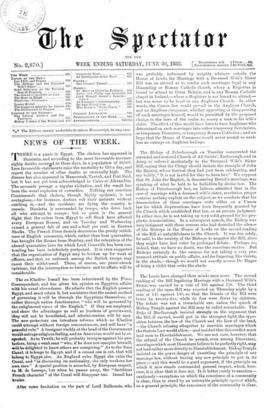The Bishop of Peterborough on Tuesday consecrated the extended and
restored Church of All Saints', Narborough, and in doing so referred incidentally to the Deceased Wife's Sister Bill, saying that the Clergy should imitate the example of John the Baptist, whose festival they had just been celebrating, and say boldly," It is not lawful for thee to have her." We suppose that St. John the Baptist, in denouncing Herod's marriage, was speaking of what he held to be forbidden by divine law. The Bishop of Peterborough has, we believe, admitted that in the case of marriage with a deceased wife's sister, revelation proper contains nothing explicit on the subject, so we conclude that his denunciation of these marriages rests either on a Canon law for which dispensations have been frequently granted by the Church which established that law, or on private judgment. In either case, he is not taking up very solid ground for his pro- phetic denunciations. In a subsequent speech, the Bishop was very indignant with those censors who had described the silence of the Bishops in the House of Lords on the second reading of the Bill as unfaithfulness to the Church. It was due solely, he said, to the anxiety of the Bishops to negative the Bill, since they might have lost votes by prolonged debate. Perhaps so; indeed, that, we have no doubt, was the conscious motive. But Bishops certainly do like excuses for not taking a very pro- nounced attitude on public affairs, and for lingering, like violets, in the shade,—though we would not exactly accuse Dr. Magee of being a violet that seeks the shade.


































